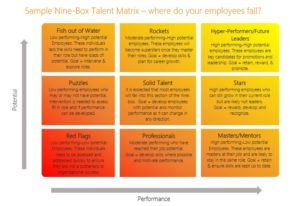
One popular way of looking across talent in an organization is the 9-block. A matrix that compares performance of an employee against their potential.
One year, following our company’s use of this matrix, my manager shared that in discussion with a broader executive group, one particular leader refused to consider my manager’s high-potential assessment of my future impact (potential) . He, apparently, “just didn’t see it.”
I’ll claim responsibility…if he didn’t see it, I wasn’t showing it to him. But, that’s not what I want to write about here.
I want to write about the misguided idea that anyone other than the person himself or herself knows the potential in a person.
Potential is defined as “having or showing the capacity to become or develop into something in the future” or “latent qualities or abilities that may be developed and lead to future success or usefulness”.
Potential is what is in each of us. It just needs to be unleashed. We all, EVERY ONE, are high potential. Each has the capacity to become or develop into something in the future. Toyota’s ad during Superbowl LII says this better than I ever could.
People sometimes choose whether to access or use all of their potential. Or, perhaps, they are in a season of life where ‘potential’ needs to be spread across a few different roles and it gets a bit diluted.
What I know for sure is this: potential should never be judged by another. Potential is what God has given us. It is we who choose where to invest that potential. And, ultimately, turning potential into something is our choice.
Since that day, I’ve refused to comment on someone else’s potential. Not only is it wrong, but my perspective would be useless data.
I much prefer the framework offered in Radical Candor that focuses on an employee’s growth trajectory and understands that employees will ebb and flow between a steep growth and gradual growth trajectory — and one is not better than another. In fact, great teams have a mix of both. And, depending on the role or events in the life of an employee, they will choose which trajectory is right for them.
Asking a new dad to take a role on a steep growth trajectory is likely not a good match, and will lead him to feelings of disengagement and burn out. But, a good manager won’t assume which trajectory a person wants…she will have an open dialogue and ask the employee, after ensuring she’s created an environment where all answers are equally good.
So, your assignment for today:
- Have an opinion – is ‘potential’ something someone else can assess?
- Think about your potential – are you uncovering it? Using it fully? Why or why not?
- What alternatives do you suggest to help organizations understand the past and future contribution value of individuals?
Image credit: Employee Performance. More on the 9-block can be found on their site.
